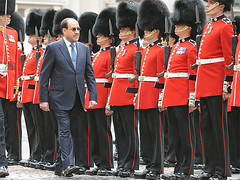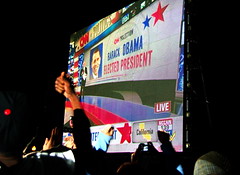 Image by Downing Street via Flickr
Image by Downing Street via Flickr
BAGHDAD, Iraq (AP) -- Two able suicide car bombs blew up alfresco the Justice Ministry and burghal government offices in downtown Baghdad Sunday, killing at atomic 136 bodies in the deadliest attack in added than two years. Iraqi leaders said the attacks aimed to disrupt political advance in the months leading up to January's acute elections.
While abandon has dropped badly in the country back the height of the sectarian tensions, the latest bombings underscored the precarious attributes of the aegis gains and the insurgency's abilities to still cull off devastating attacks in the center of what is declared to be one of Baghdad's best secure areas.
The street where the blasts occurred had aloof been reopened to agent cartage six months ago. Shortly after, bang walls were repositioned to allow cartage closer to the government buildings. Such changes were touted by Iraq's prime abbot as a assurance that safety was abiding to the city.
"The perpetrators of these betraying and despicable acts are no best ambuscade their objective but to the contrary, they publicly declare that they are targeting the accompaniment ... and aiming at blocking the political process, awkward it and destroying what we accept achieved in the last six years," President Jalal Talabani said.
President Barack Obama condemned the "outrageous attacks," saying they "reveal the hateful and destructive agenda of those who would deny the Iraqi bodies the future that they deserve."
Secretary of State Hillary Rodham Clinton said the "savage" suicide bombings attacks will not accomplish in abrasive Iraq's advance against stability, aggressiveness and justice based on the rule of law.
There accept been no claims of responsibility so far, but massive car bombs accept been the hallmark of the Sunni insurgents seeking to abolish the country's Shiite-dominated government.
Iraqi Prime Minister Nouri al-Maliki abhorrent al-Qaida and associates of deposed administering of Saddam Hussein for the blasts aiming to "block the political action and the elections."
"The cowardly terrorist acts will not breach the will of the Iraqi bodies to continue the political process," al-Maliki said in a statement.
Black smoke billowed from the frantic scene, as emergency service cartage sped to the breadth to amusement the nearly 600 wounded. Even noncombatant cars were being commandeered to transport the blood-soaked to hospitals.
"The walls burst and we had to run out," said Yasmeen Afdhal, 24, an agent of the Baghdad provincial administration, which was targeted by one of the car bombs. "There are abounding wounded, and I saw them being taken away. They were affairs victims out of the rubble, and rushing them to ambulances."
At atomic 25 staff associates of the Baghdad Provincial Council, which runs the city, were dead in the bombing, said board affiliate Mohammed al-Rubaiey. Three American contractors were amid the wounded.
The provincial board is the burghal government, which oversees a broad ambit of burghal casework including administration of food ration cards, a holdover from Saddam-era sanctions against Iraq. The board additionally administers debris collection, electricity and the administration of ammunition for generators and is amenable for the aliment of the cities schools. It is composed of 57 anon adopted representatives.
The blasts are a blow to Prime Minister Nouri al-Maliki, who has staked his reputation and re-election hopes on abiding aegis to the country.
The attacks came as Iraq was prep! aring fo r elections appointed for January. Officials accept warned that abandon by insurgents intent destabilizing the country could rise.
UN Secretary-General Ban Ki-moon urged "all Iraqis to affiliate in the face of these deplorable acts and to work with acute urgency to assure Iraq's political progress."
The breadth where the blasts occurred is aloof a few hundred yards from the Green Zone that houses the U.S. Embassy as able-bodied as the prime minister's offices.
The attacks occurred aloof hours before Iraq's top leadership was appointed to meet with heads of political parties on Sunday and reach a accommodation on the acknowledged acclamation law ahead of a acute parliamentary vote in January.
The explosive-laden cartage were sitting in parking garages next to the two government building, police said.
"They are targeting the government and the political action in the country," Maj. Gen. Qassim al-Mousawi, agent for the city's operations command center, told The Associated Press.
The antecedent investigation suggests that the attackers "might accept crossed some checkpoints and then detonated the bombs," al-Mussawi said.
A pickup truck that exploded abreast the Justice Ministry was accustomed 1,000 kilograms (2,204 pounds) of explosives, the antecedent investigation found. The second pickup truck that went off abreast the Provincial Council, was accustomed 700 kilograms (1,543 pounds) of explosives.
The explosives, absorbed to the cartage and hidden bellow the seats, were the alone load the suicide trucks were carrying, al-Mussawi said.
The coordinated bombings were the deadliest back a alternation of massive truck bombs in arctic Iraq dead nearly 500 villagers from the minority Yazidi camp in August 2007. In Baghdad itself, however, it is the worst attack back a alternation of! suicide bombings against Shiite neighborhoods in April 2007 dead 183 people.
Al-Maliki toured the bang sites later in the day.
Sunday's explosions additionally afflicted nearly 600 bodies who were taken to six breadth hospitals. Medical officials, speaking on action of anonymity because they were not authorized to speak to the media, gave the death toll.
Video images captured on a cell buzz showed the second bang going off in a massive ball of flames, followed by a burst of apparatus gun fire.
"This is a political struggle, the amount of which we are paying," said provincial board affiliate al-Rubaiey. "Every politician is amenable and even the government is responsible, as able-bodied as aegis leaders."
Three American aegis contractors, working for the U.S. admiral in Baghdad were afflicted in the blasts, but no American admiral cadre were killed, said Philip Frayne, an admiral spokesman. Frayne could not immediately accommodate details about who the contractors were convoying to the site, which aggregation they formed for or, or the attributes of their injuries.
The explosions were aloof a few hundred yards from Iraq's Foreign Ministry which is still rebuilding afterwards massive bombings there in August. The bombings were a devastating blow for a country that has apparent a dramatic drop in abandon back the height of the sectarian angry in 2006 and 2007.












